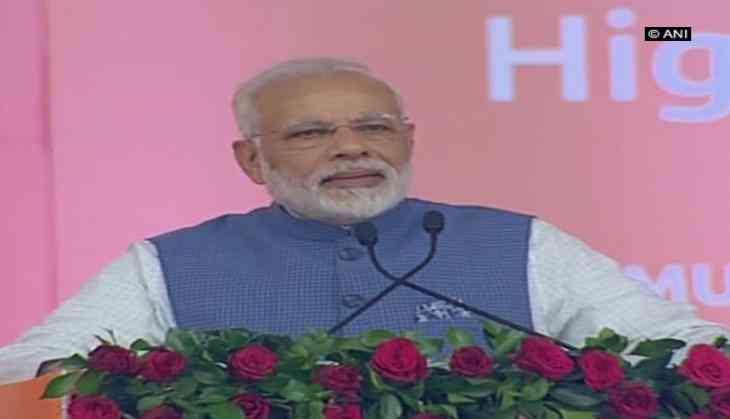
Prime Minister Narendra Modi said that 'friend' Japan gave India a loan worth Rs. 88,000 crore at 0.1 per cent interest, even as he, along with his Japanese Prime Minister Shinzo Abe, laid the foundation stone for the proposed Ahmedabad-Mumbai High-Speed Rail Network, known as the bullet train, here today.
Prime Minister Modi further praised Prime Minister Abe for taking a personal interest in the bullet train project and ensuring that it fructifies into something huge for India.
"If the inauguration for this project is taking place so soon, the credit goes to Shinzo Abe. He took a personal interest to see that this project goes smoothly without any difficulties," Prime Minister Modi said.
"This is a historic and emotional day for India-Japan ties," he added.
Prime Minister Modi also stressed on the economic development of the nation and said that the bullet train has a direct relation with productivity.
"Shinzo Abe was telling us the kind of difficulties Japan had to face after the Second World War. But after 1964, with the establishment of the bullet train, the country saw fast development," he said.
"People get the benefits of connectivity through various ways," he said and added that everyone knows about how there was a fast growth in America after the railways were established there.
He further said that because of the bullet train project, the entire area between Mumbai and Ahmedabad will come in a Single Economic Zone.
"The trade will be encouraged. The connectivity between places will increase. Whether this leads to transfer of manpower or exchange of goods, these aspects of connectivity will become very simple," said the prime minister.
"Be it railways, highways, waterways or airways, we are focusing on all areas," he added.
Prime Minister Modi further said that the project would bring about employment and speed, adding that it is human-friendly and eco-friendly.
He also emphasised that India is only taking technology from Japan; however, the most resources will be arranged in India.
He also mentioned that the government is constructing roads faster than ever.
"The transport system has also benefitted from the Good and Services Tax (GST)," he said.
"In the entire economy, 30 per cent development in the transport system took place because of the GST," he added.
"In the last three years, 3 crore new domestic flyers have been added to the civil aviation system."
The bullet train, which has a capacity to accommodate 750 people, is expected to reduce travel time between the two cities from seven to three hours.
On the Ahmedabad-Mumbai route, total 12 stations have been proposed that include Mumbai, Thane, Virar, Boisar, Vapi, Bilimora, Surat, Bharuch, Vadodara, Anand, Ahmedabad and Sabarmati.
The distance of 508 km will be covered in two hours and seven minutes by the bullet train if it stops at four stations namely Ahmedabad, Vadodara, Surat and Mumbai.
According to the railway ministry officials, the operating speed of the bullet train will be 320 kilometers per hour and the maximum speed will be 350 kilometers per hour.
With this, India has become the first to import the iconic 'Shinkansen' bullet-train technology after Taiwan. The Japanese Government has also agreed to fund the project at minimum interest rates.
-ANI


